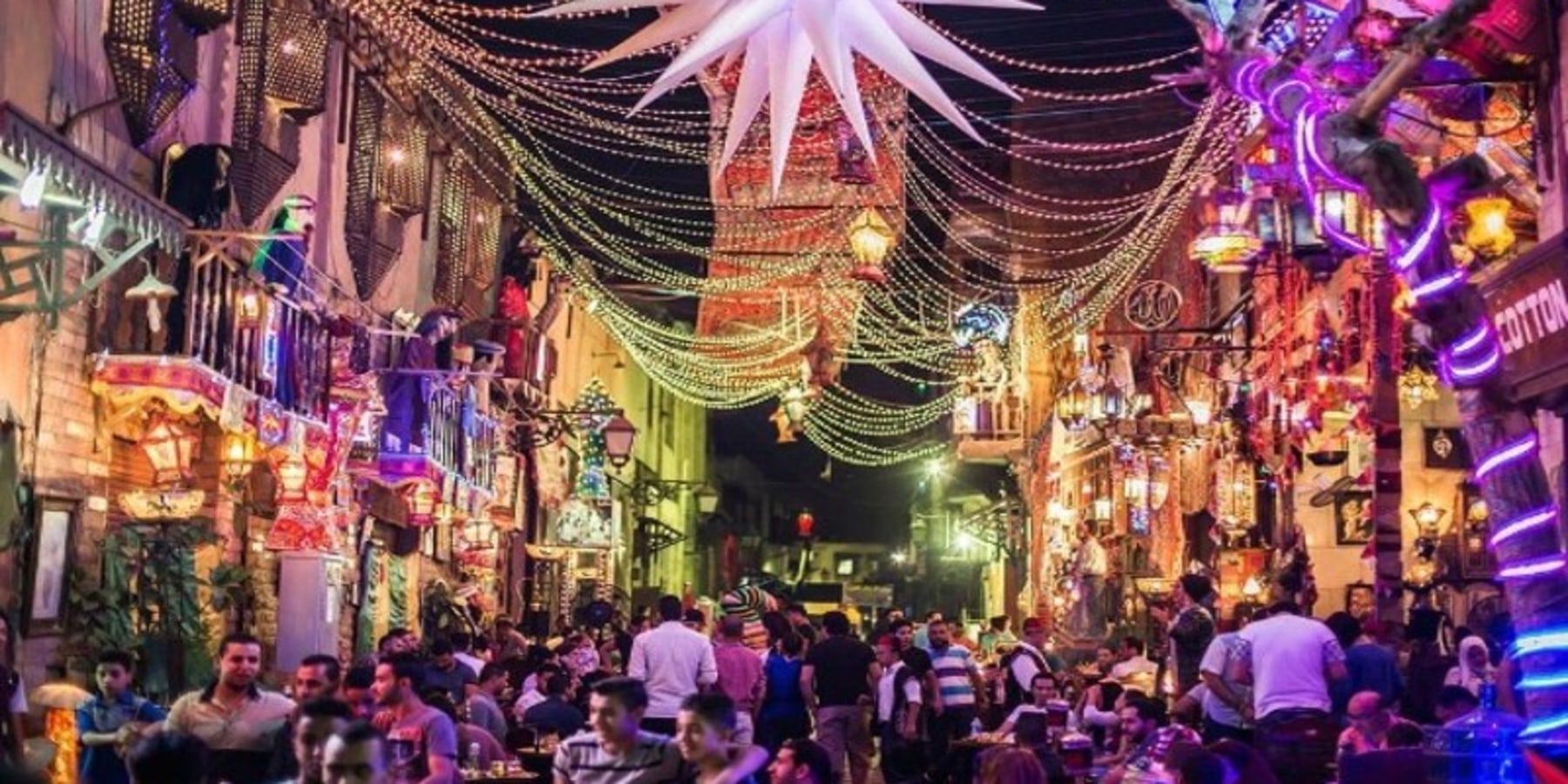
Islamic Festivals and Holidays
First of Moharam
It’s a new Hijary or Islamic year according to the Islamic calendar. And it’s considered a holiday for all Egyptians.
Rabea Awaal 12th
It’s a major Islamic festival that marks the birthday of the prophet Mohammed (peace be upon him) and we call it in Egypt “Moulid al Nabawy“. Most streets are filled with acrobats, drummers, and musicians. Families join together to greet each other and exchange gifts like the traditional sweets “Halawet El-Moulid” (a type of halvah or candy) and candy dolls are called are sold from roadside stands as well as hummus (a puree made from chickpeas), the traditional food of Moulid an-Nabi. And it’s also a holiday in Egypt for all Egyptians.
Ramadan in Egypt
During the month of Ramadan, Muslims refrain from eating, drinking, smoking and sexual activity between sunrise and sunset every day.
People join with their families to break the fast with gigantic feasts called ‘Iftar’. The first item traditionally consumed being dates. To ensure energy levels are maintained throughout the day, Muslims will also rise early before sunrise to once again fuel their bodies with food before the fasting begins and this meal is called Suhor.
Ramadan is the highlight of the Islamic calendar, a month-long festival characterized by both great restraint and great indulgence. Visiting Egypt during Ramadan make your Egypt tours full more suspense, and you’re likely to see Egyptian at their most generous form. The customary greeting to be recited wherever possible has a generous Ramadan or “Ramadan Kareem“.
Travelling during Ramadan does have its perks. Getting into the rhythm of the fast can be a very rewarding experience. After sunset, the streets come alive and people stay out celebrating and eating late into the night. If you walk in the street around sundown, there is a good chance that you will be invited to eat with a group of fast breakers. Non-Muslims are not expected to observe the fast but should be conscientious of the fact that most people around them are fasting. Refraining from smoking and eating in public is considered polite.
Eid al-Fitr
The first day after Ramadan called Shawal and it’s the 10th month of Islamic Calendar (from 1st to 3rd of Shawal) which begins a three- or four-day holidays in Egypt called Eid al-Fitr. After the final fast-breaking (Iftar), it lasts for three days, but depending on how it falls on the calendar, the festivities could last much longer if they including weekends or national holidays. For example, if the three days fall mid-week, Festivals will continue till the end of the weekend. The most common greeting is “Eid Mubarak”, which means “Have a blessed Eid!,”
Al Adha Eid
From 10th to 13th Zo Al Haga Feast of the Sacrifice honours the willingness of Prophet Ibrahim to sacrifice his son, as an act of obedience to Allah’s (God) command. Before Ibrahim sacrificed his son, God provided a male animal to sacrifice instead. In commemoration of this, an animal is sacrificed and divided into three parts: one-third of the share is given to the poor and needy, another third is given to relatives, friends, and neighbours, and the remaining third is retained by the family.
Coptic Holidays
Coptic Christmas and Coptic Easter are both national holidays.
Coptic Christmas is on January 7th and in recent years, more of the trappings of the Western Christmas celebration has been making it to Egypt. You may see more Santa hats, Christmas lights and Christmas trees than you ever expected to see in Egypt around this time of year.
Coptic Easter also coincides with a much older holiday that traces its roots back to Pharaonic times called Sham al-Nessim. The name literally means ‘sniffing the breeze’ and it is a celebration of the arrival of spring that usually takes place in April. The holiday carries some traditions that might be familiar as they parallel the Western celebration of Easter, such as egg painting. In general, Sham al-Nessim is celebrated outdoors with families enjoying picnics in green spaces and enjoying eating specific foods like a type of pickled fish called fesikh or fseekh.
National Festivals & Holidays
The following holidays are celebrated across Egypt across the country as government offices and ministries are closed.
25 January
The day of the start of the Egyptian revolution against “President Mubarak” is celebrated on January 25, 2011, and is also the National Police Day. It’s a party in Egypt.
23 July
On July 23, Egypt celebrated the Egyptian revolution in 1952 against King Farouk and was the main reason for the end of the Kingdom of Egypt.
April 3-25.
The day of the liberation of Sinai marks the definitive withdrawal of all Israeli military forces from the Sinai peninsula during the government of President Muhammad Anwar Sadat in 1982, which is a holiday in Egypt.
1 May
Labour Day is a holiday for all Egyptians.
6 October
Egypt celebrates its first military victory in the October war, which led to the liberation of Sinai from occupation even during the government of President “Mohamed Anwar Sadat”
Social Festivals
Mother’s Day
It’s on March 21 as a kind of appreciation for Egyptians mothers but it’s not a public holiday in Egypt.
Spring Day
It has no fixed day but it’s most probably in April or May during spring. It’s a public holiday where Egyptians like to go to national parks and eat dry fish and fruits so when you visit Egypt during that holiday, you’ll find everything is different in Egypt.

